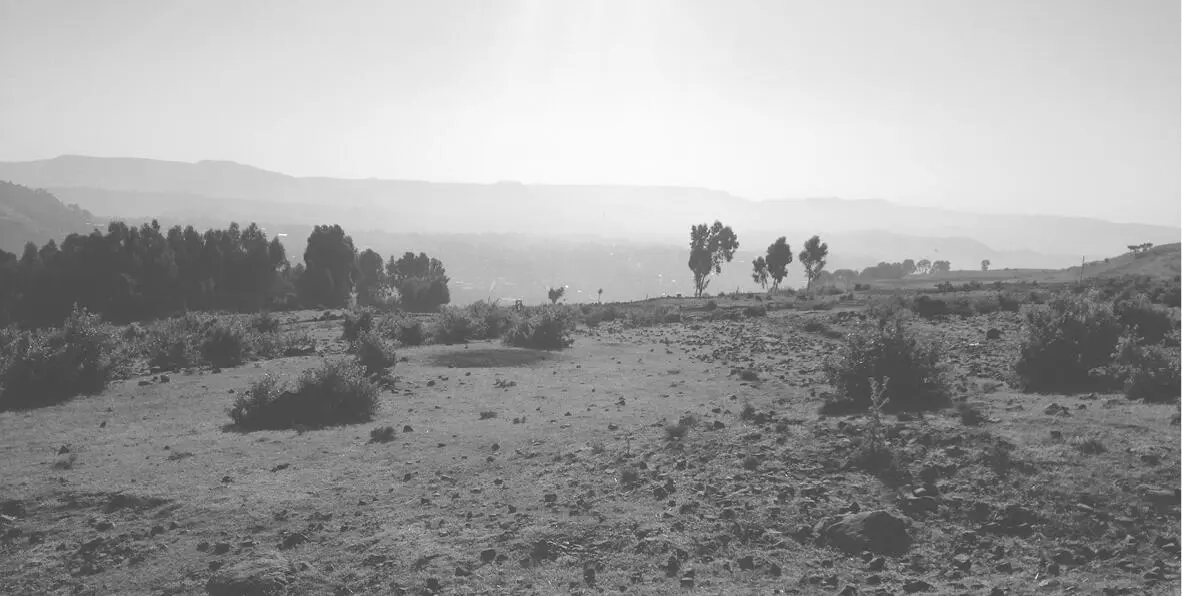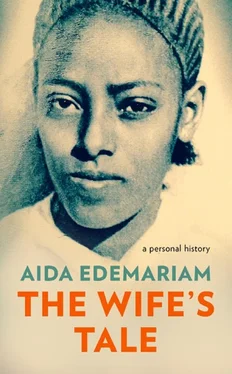And so the service, in which each accoutrement – sceptre, orb, spear, ring, crown – was blessed by the archbishop and by a scholar of the north, of the south, of the east and of the west, a service interspersed by the voices of ten deacons handing their chants back and forth, back and forth, unspooled with the solemnity and intimacy of a wedding. (Though no weddings would have been accompanied, as midday approached, by a vast roaring in the sky as Tafari’s beloved aeroplanes swooped and looped in fealty.) As in a teklil wedding the vows were followed by a mass; as in a wedding the ceremony included communion, for which Tafari and his wife were required to return to the sanctuary and replace their rich robes with something simpler. As in a wedding the service was brought to a close by qiné after rich dense qiné, one of which was delivered by Aleqa Tsega. And then Emperor Hailè Selassie I, Conquering Lion of the Tribe of Judah, King of Kings of Ethiopia, elect of God, climbed into a horse-drawn carriage and was driven away.
When at last Aleqa Tsega returned to Gondar his coming was heralded by a warning: you are the wife of a great man now. The emperor has tied a circlet of gold about his head. When most of the foreigners had departed and the daily banquets and firework displays were tapering off Aleqa Tsega had answered a summons to the palace, where he joined whispering huddles of clerics and lords, all wondering why they were there. Promotion, it transpired: Emperor Hailè Selassie, who knew well how favour, generously bestowed, tightened the reins of loyalty and obligation (especially in those of humble birth), was parcelling out authority over sections of his realm. Aleqa Tsega returned a liqè-kahinat, chief of the learned, of all of Semien and Begemdir. But at the time she understood only that she would have been happier if he had not come back at all.
BOOK II

The landscape around Gonderoch Mariam. Photograph by the author.
THE THIRD MONTH
Ripening of later cereal grains, sunny, occasional mists. Harvest, especially of early teff. Boys take cattle from sun-scorched uplands to green valleys. Flirting season.
Mariam Mariam Mariam Mariam Mariam, dirèshilin.
O Lady Lady Lady Lady Lady, come to our aid.
Her next labour went quickly, and twelve ililta rang out before dawn. A boy.
She basked in congratulations. Her husband basked in congratulations.
On the third day a family friend came to visit, ululating. This friend knew how the first birth had gone; that Yetemegnu had not been able to sit for months. That they had kept trying to feed her barley gruel sweetened with honey, and when that failed honey with water, but she didn’t like honey, and again and again she had closed her lips tight and turned away.
This time they brought her wheat porridge full of fortifying butter, and this she had accepted.
She smiled at their friend. The boy has not yet been washed – would you do the honours? His skin is darker on one side than the other, don’t be surprised.
‘Of course.’ And their friend had fetched Lux and water and rearranged her shawl, freeing her arms to work.
‘Oh!’
What is it?
‘She’s a girl, not a boy!’
No. No – can I see?
The child’s umbilicus had been cut long, and an attendant, glancing cursorily, taken at her mistaken word.
Oh no! The father was so pleased to have a boy! I was so pleased to have a boy!
And then, desperate, How do I tell him?
Their friend considered her. ‘Take your time, and do it carefully.’ She smiled. ‘Wait until he’s had his lunch, at least.’
Preparations for the christening party were nearly complete when, just under three months later, the girl died, under a light shawl Yetemegnu had placed over her to protect her as she slept.
They had left the house near Ba’ata because there was no water. No pipes serving it, no springs save the holy springs, no well. Only the Qeha river, close enough as the kite flies but down and then, carrying the big-bellied madigas on their backs, back up such steep paths that the slaves she sent were exhausted for the rest of the day. Sometimes she took pity on them and went to the water-sellers instead. Then they heard that a man who owned a plot of land on the edge of the Saturday market had committed a murder and fled. They were all pleased when her husband paid a messenger twenty pieces of raw silver to track the murderer down and make him an offer. Sixty silver thalers for the land, then; and a hundred to sink a well.
Her husband built a house of hewn stone, held together with trampled mud and straw, with stairs at each end and in front a round hall in which to receive visitors. A little building off to the side for grinding grain, and on the ground floor of the main structure rooms to keep it in; rooms for fermenting beer, for storing mead, and above them a private living room and their bedroom, with low wooden chests and their clothes hanging on hooks on the wall. The windows on this floor faced sunset and sunrise, and when she was alone she could stare out the west window, over the roofs and into the valley, where in the dry season the Qeha crawled sluggish with algae, and in the wet season rushed wild, a muddy and perilous torrent. If she turned a little, toward the north, she could see a darker circle of high old trees, which always meant, here is consecrated ground.
If her second daughter really had been a boy, he would already have been baptised, and named, at forty days; girls, however, were baptised at eighty, and so the tiny body had had to be laid in unmarked earth just outside Ba’ata’s walls. She had not been allowed to attend the burial, mothers in her position rarely were, and consequently she had been denied a formal farewell. Now, standing at the window or bending over the fire or walking through the wide rooms of her new dominion, she often found herself in tears. Sometimes she knew she wept for her unnamed daughter, lying in the cold outside the church, sometimes for her mother, sometimes for herself. Sometimes she was not sure what she wept for, only that the tears leaked silent down her face and would not stop.
Of course she also knew how often deaths like this happened – why else were mothers not allowed to leave the house until the eighty days were up, but to keep a baby safe from illness, from strangers, from the evil eye? Except she felt that it was she, sitting at home, who had caused the danger, and she who now checked and rechecked every blanket, every shawl placed near Alemitu, waking in a panic in the middle of the night to check again. Why else did fathers so often keep their distance through the first years, afraid of attachment to a child who might not survive? Well, there was no problem with that – she kept her distance from him, speaking only when spoken to, and often not then.
But at fifteen she was still so young, and Alemitu – raised on rich butter from Qimant country, and still feeding from breasts now heavy with milk for the absent child – Alemitu was growing fast. They played together, running through the wide yard, and she would laugh at the attempts at language, laugh at the serious, halting explorations, slap hands away from danger, wonder at each small important thing learned, existing only in the bright present of both their childhoods.
And there was now so much work. Every morning she woke as the sun began to crest the mountains. Quiet, in near-dark, she would slip out from under her blankets and shiver over to the madiga, dipping a gourd into cold clear well water and splashing her face awake. From the silhouettes of the other houses would come the scrunch of stone against stone as the first grain was ground, and the smell of sleeping fires blown back into flame. Roosters crowed into thin mountain air. The occasional dog barked. Figures wrapped tight against the chill hurried back from the woods.
Читать дальше













